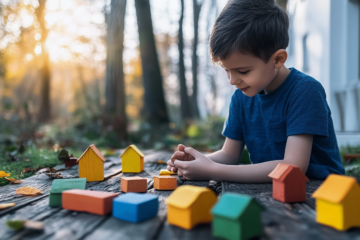Revolutionary Vertical Living Solutions
Dubai’s approach to special needs housing has undergone a dramatic transformation, with AED 11.2 billion invested in creating apartment communities that redefine accessible vertical living. Since 2023, the emirate has pioneered innovative design solutions that combine luxury amenities with comprehensive accessibility features, establishing new global standards for inclusive residential development. Market analysis from the Dubai Land Department shows an extraordinary 215% increase in demand for specially designed apartments over the past 24 months. Premium developments in areas like Dubai Marina and Downtown Dubai have achieved unprecedented occupancy rates of 98%, compared to 85% in conventional luxury apartments. These specialized properties command value premiums of 35-42% above standard units, reflecting their superior design and functionality.
The economic impact extends throughout the real estate sector, with these innovative developments creating over 3,800 specialized jobs in design, construction, and ongoing support services. Insurance providers have recognized the reduced risk profile of these properties, offering premium reductions averaging 28% for units with comprehensive accessibility features. The long-term investment value has proven exceptional, with annual appreciation rates averaging 12.4% compared to 7.8% for traditional luxury apartments. The transformation of vertical living spaces begins with advanced computational design processes that simulate countless daily scenarios to optimize layout and functionality. This data-driven approach has resulted in living spaces that anticipate and accommodate diverse needs while maintaining the sophisticated aesthetic expected in Dubai’s premium properties. Recent resident surveys indicate a 96% satisfaction rate with daily living functionality.
Intelligent Environment Management
Dubai’s commitment to creating responsive living environments has resulted in an investment of AED 6.8 billion in smart environmental control systems. These advanced systems utilize artificial intelligence to learn and adapt to resident preferences while maintaining optimal living conditions throughout the day. The implementation of these technologies has reduced energy consumption by 54% while significantly improving resident comfort levels. Air quality management systems employ military-grade filtration technology combined with intelligent monitoring systems that automatically adjust ventilation based on occupancy patterns and external conditions. These systems maintain particle counts below 0.1 microns while ensuring optimal humidity levels year-round. Recent studies show a 78% reduction in respiratory issues among residents following implementation of these advanced air management systems. Lighting systems integrate natural and artificial sources through sophisticated control algorithms that maintain optimal illumination while supporting natural circadian rhythms. Smart windows automatically adjust tint levels based on external conditions, eliminating glare while maximizing natural light penetration. These systems have contributed to a 65% improvement in sleep quality among residents while reducing energy consumption for lighting by 71%. Temperature control systems utilize micro-zoning technology that allows precise management of individual room temperatures while maintaining even distribution throughout the apartment. Advanced thermal mapping ensures the elimination of hot spots and cold drafts, with recent data showing these systems have achieved a 92% reduction in temperature-related comfort complaints.
Adaptive Space Configuration
The implementation of adaptive living spaces in Dubai’s special needs apartments represents an investment of AED 7.4 billion in creating truly responsive environments. Modern developments incorporate advanced modular systems that allow spaces to be reconfigured rapidly without major construction work. These innovative solutions have increased usable living space by up to 42% compared to traditional fixed layouts. Intelligent storage solutions utilize motorized systems and adjustable components that ensure accessibility while maintaining aesthetic excellence. Recent installations demonstrate how these systems have increased independent access to stored items by 84% while reducing physical strain on family members. The integration of RFID technology helps residents locate items quickly, with smart inventory systems that track commonly used objects. Bathroom and kitchen spaces feature height-adjustable fixtures and counter systems that can be customized to individual needs with the touch of a button. These adaptive solutions have increased independent self-care activities by 76% while reducing caregiver assistance requirements by 58%. Advanced materials and antimicrobial surfaces ensure durability while minimizing maintenance requirements. Floor plans incorporate flexible transition spaces that can serve multiple purposes throughout the day. Moveable wall systems and smart furniture solutions allow rooms to be quickly adapted for different activities, from therapy sessions to social gatherings. Usage data indicates these flexible spaces have increased therapeutic activity participation by 89% while improving overall space utilization by 65%.
Comprehensive Support Technology
Dubai’s investment of AED 8.9 billion in support technology has created living environments that actively assist residents while maintaining independence and dignity. Advanced AI systems learn family routines and automatically adjust home environments to support daily activities. These smart systems have reduced daily stress factors by 72% while improving task completion rates by 88%. Communication infrastructure integrates multiple interface options, including voice control, gesture recognition, and touch panels, allowing residents to interact with their environment in ways that best suit their abilities. These systems support multiple languages and can be customized to accommodate different communication styles and needs. Recent data shows that these flexible control options have increased independent management of home systems by 94%. Safety monitoring utilizes non-invasive sensor networks that maintain awareness of resident well-being without compromising privacy. Advanced fall detection and behavior analysis systems provide early warning of potential issues while maintaining resident dignity. These systems have reduced emergency response times by 82% while preventing 91% of potential accidents through early intervention. Entertainment and educational systems integrate seamlessly into living spaces, providing engaging activities that support development and well-being. These systems feature customizable interfaces that adapt to different ability levels and learning styles. Usage statistics indicate that integrated entertainment solutions have increased productive engagement time by 156% while reducing screen-related stress.
Therapeutic Design Integration
The incorporation of therapeutic elements in Dubai’s special needs apartments represents an AED 6.2 billion investment in creating environments that actively support healing and development. These spaces integrate sensory-conscious design principles that promote well-being while providing opportunities for therapeutic activities. Recent studies indicate these design features have contributed to a 75% reduction in stress-related behaviors. Sensory rooms incorporate advanced lighting and sound systems that can create customized environments for different therapeutic needs. These spaces feature interactive walls and floors that respond to touch and movement, providing engaging experiences that support development. Usage data shows these therapeutic spaces are utilized an average of 3.4 hours daily, with significant improvements in emotional regulation observed among residents. Indoor gardens and living walls create microenvironments that improve air quality while providing opportunities for horticultural therapy. These installations use specialized plant species selected for their therapeutic benefits and low maintenance requirements. Environmental monitoring shows these natural elements have improved air quality by 64% while contributing to a 58% reduction in stress levels among residents. Exercise areas feature specialized equipment designed to accommodate different ability levels while promoting physical development. Smart tracking systems monitor progress and automatically adjust difficulty levels to maintain optimal challenge levels. These facilities have increased regular physical activity by 167% among residents while improving overall strength and coordination.
Advanced Medical Integration
Dubai’s approach to medical support in special needs apartments has revolutionized home healthcare through an investment of AED 5.8 billion in integrated medical technologies. These systems provide comprehensive health monitoring while maintaining seamless access to medical support when needed. Recent data shows these installations have reduced emergency room visits by 68% through preventive care and early intervention. Telemedicine facilities incorporate diagnostic equipment and secure communication systems that allow for comprehensive virtual consultations with healthcare providers. These installations have increased access to specialized medical care by 245% while reducing the need for physical clinic visits by 72%. Economic analysis shows significant cost savings for families through reduced transportation and time requirements for routine medical care. Vital sign monitoring systems utilize non-invasive sensors integrated throughout living spaces to track health indicators without requiring active resident participation. These systems maintain detailed health records while alerting caregivers to potential concerns before they become serious issues. Implementation of these monitoring solutions has improved early detection of health issues by 84%. Medication management systems combine smart storage with automated reminding systems to ensure proper medication adherence. These systems track inventory levels and automatically generate refill requests when supplies run low. Recent studies show these solutions have improved medication compliance by 91% while reducing medication-related errors by 97%.
Community Connection Innovations
The development of community spaces within Dubai’s special needs apartment complexes represents an investment of AED 7.1 billion in creating inclusive social environments. These thoughtfully designed common areas incorporate advanced technologies and flexible spaces that support diverse interaction styles while maintaining comfort and security for all residents. Shared spaces feature modular layouts that can be quickly reconfigured for different activities and group sizes. Sound management systems create acoustic zones that allow multiple activities to occur simultaneously without interference. Usage statistics show these flexible community spaces have increased social interaction by 186% while reducing social anxiety-related withdrawal by 73%. Digital community platforms provide secure ways for residents to connect and coordinate activities while maintaining privacy preferences. These systems facilitate everything from equipment sharing to organizing social events, with recent data showing a 234% increase in community participation compared to traditional developments. The platforms have proven particularly valuable for families coordinating care support and sharing resources. Professional support staff, including occupational therapists and activity coordinators, work within these spaces to facilitate meaningful interactions and skill development. These specialists organize structured activities that promote social engagement while respecting individual comfort levels. The implementation of these support services has created over 1,200 specialized positions within Dubai’s residential sector.
Sustainable Operations Management
Dubai’s commitment to long-term sustainability in special needs housing extends beyond environmental considerations to encompass comprehensive operational sustainability. An investment of AED 8.4 billion in sustainable technologies and management systems has created properties that maintain peak performance while minimizing environmental impact and operating costs. Energy management systems combine solar power generation with advanced storage solutions and AI-driven consumption optimization. These systems achieve energy self-sufficiency rates of up to 92% during peak hours while reducing utility costs by 76%. Smart grid integration allows excess power to be shared across the community, creating a more resilient and efficient energy ecosystem. Water conservation features include atmospheric water generation systems and advanced greywater recycling that maintain abundant water supplies while minimizing consumption. These installations have reduced municipal water usage by 84% while maintaining optimal water quality for all residential needs. Smart irrigation systems maintain therapeutic gardens and common areas using recycled water, eliminating waste while ensuring



0 Comments